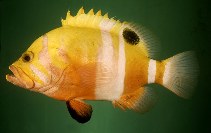| Family: |
Epinephelidae (Groupers) |
| Max. size: |
43 cm TL (male/unsexed) |
| Environment: |
demersal; marine; depth range 80 - 250 m, non-migratory |
| Distribution: |
Pacific Ocean: southern Japan, Taiwan, Guam, Philippines, South China Sea, Samoa, and Tahiti in French Polynesia. Reported from Fiji and Tuvalu (Ref. 12690). |
| Diagnosis: |
Dorsal spines (total): 9-9; Dorsal soft rays (total): 14-14; Anal spines: 3-3; Anal soft rays: 9-9. Distinguished by having the following characteristics: body depth 2.0-2.4 in SL; body width 2.3-2.6 in depth; caudal peduncle depth equal to or greater than length; head length 2.3-2.5 in SL; dorsal head profile straight or slightly concave to above eye, nape markedly convex; flat interorbital area; rounded preopercle, finely serrate, ventral serrae slightly enlarged, lower edge irregular but hidden by skin; subopercle and interopercle finely serrate; distinctly convex upper edge of operculum; maxilla naked, reaching vertical at rear edge of eye, prominent knob on ventral rear corner; ctenoid body scales, without auxiliaries (Ref. 089707). |
| Biology: |
A rare species found in deep waters, a specimen was caught at 250 m from Tahiti, French Polynesia. Feeds on fishes and crustaceans (Ref. 089707). |
| IUCN Red List Status: |
Least Concern (LC); Date assessed: 17 November 2016 Ref. (130435)
|
| Threat to humans: |
harmless |
Source and more info: www.fishbase.org. For personal, classroom, and other internal use only. Not for publication.
